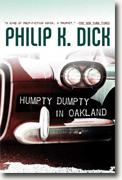Humpty Dumpty in Oakland
Philip K. Dick
book reviews:
· general fiction
· chick lit/romance
· sci-fi/fantasy
· graphic novels
· nonfiction
· audio books
· author interviews
· children's books @
curledupkids.com
· DVD reviews @
curledupdvd.com
newsletter
win books
buy online
links
home
for authors
& publishers
for reviewers

 |
Humpty Dumpty in Oakland Philip K. Dick Tor Paperback 256 pages September 2008 |
|
I am a fan of Philip K. Dick’s science fiction novels, as anyone who’s read my reviews of Voices From The Street and the Library of America’s two collections of his novels, Philip K. Dick: Four Novels of the 1960s and Philip K. Dick: Five Novels of the 1960s and 70s, can attest to. A similarity between Voices From The Street and Humpty Dumpty in Oakland
The novel follows the twin plot lines of Jim Fergesson’s decision to first retire and sell his auto garage and then, later, to start his business over again in a different location where he feels he’ll have great success; and Al Miller’s attempts to fight against fate and his own lack of inner drive to make a success out of his life. Though we, as the readers, feel sympathy toward both of these characters -for Jim because he’s worked hard all of his life and has health problems, and for Al because he strives against an inexorable predestined role for his life and career - it is difficult to truly like either one of them. Jim is often gruff and abusive, acting offended at Al’s expressions of concern about Jim’s health, and Al’s natural worries about where he’ll relocate his used car lot when his lease expires and the auto repair business sale becomes final. This does nothing to endear Jim to the reader. Al conceives of a scheme to get rich by shady means: blackmailing record company owner Chris Harman for his involvement in producing records with pornographic jokes on them and for pirating material previously recorded by other companies without their permission. Nothing Al does, though, works as he plans, which prompts criticism from even his friend, Tootie: “You just a humpty dumpty,” Tootie said. “You just stand there, stand around, while it all happens to you. You just perch and watch.”Philip K. Dick was a major science fiction writer, the author of books and stories that have been made into movies - Do Androids Dream of Electric Sheep (made into Bladerunner starring Harrison Ford), Minority Report and A Scanner Darkly. Though Humpty Dumpty in Oakland Originally published on Curled Up With A Good Book at www.curledup.com. © Douglas R. Cobb, 2008 |
| Also by Philip K. Dick: |
|
|
|
 Click here to learn more about this month's sponsor! |
|
| fiction · sf/f · comic books · nonfiction · audio newsletter · free book contest · buy books online review index · links · · authors & publishers reviewers |
|
| site by ELBO Computing Resources, Inc. | |
